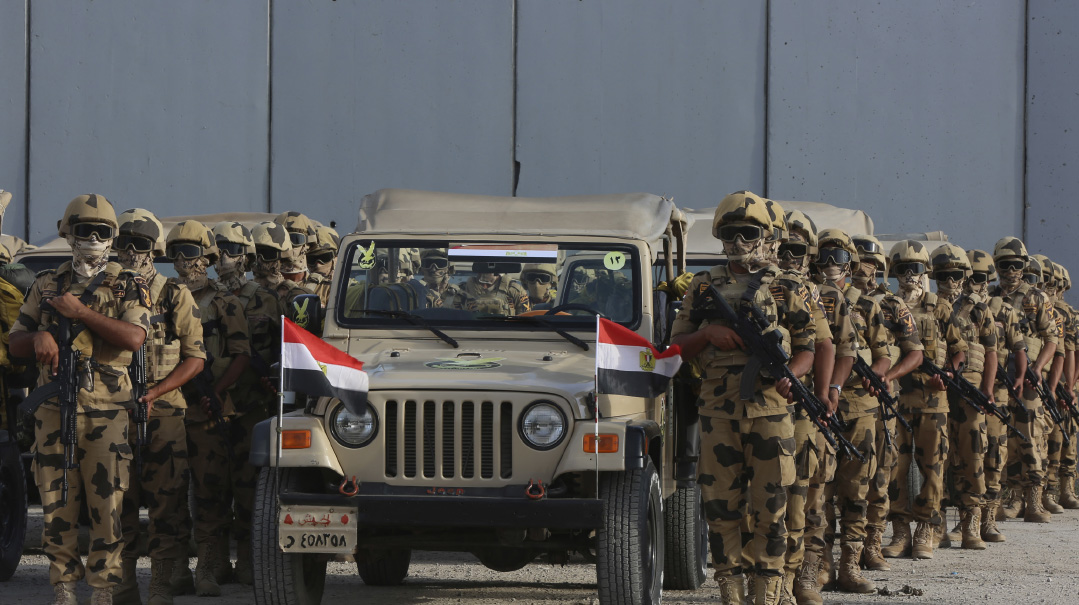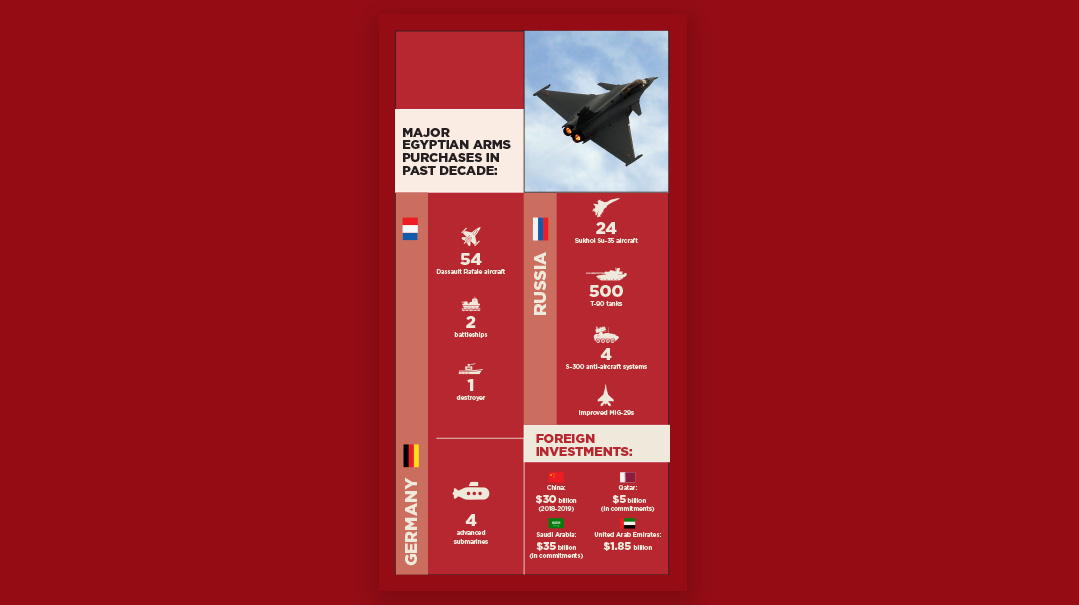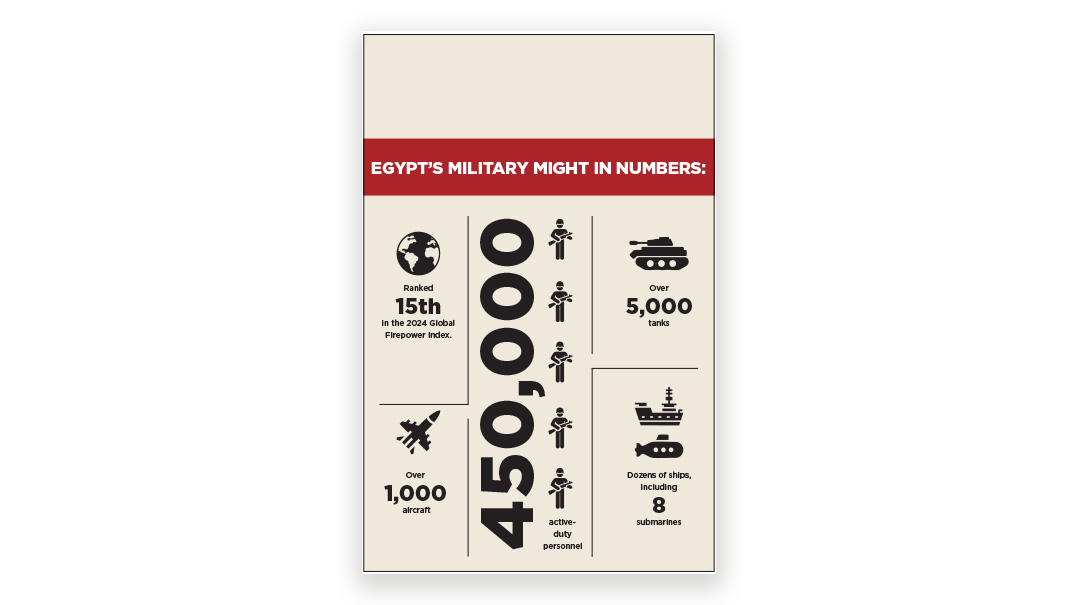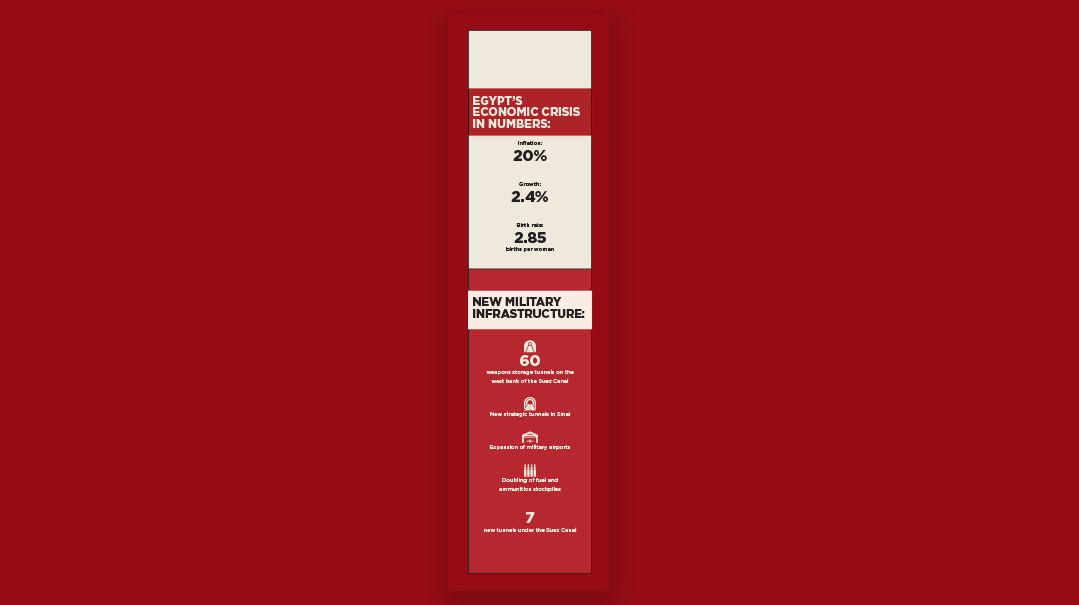Border Alert
| February 4, 2025Egypt is rearming heavily — how worried should Israel be?

Photos: AP Images
Why is Egypt — Israel’s first “partner in peace” in the 1979 Camp David Accords — in the middle of frightening military buildup in the Sinai Peninsula, on Israel’s southern border? Why is Egypt, a poor Third-World country that can’t feed itself, spending billions on upgrading its military? Why is America’s security establishment seemingly more concerned about this than Israel’s is?
Why has Israel not protested more vigorously as revelations of Egyptian collusion with Hamas before October 7 have come to light? Why is Israel ignoring the massive tunnels Egypt is constructing in the Sinai? Are we witnessing another “conceptzia” in the making?
If you thought Israel’s quietest border is the one it shares with Egypt, it’s time for a wakeup call. Last weekend in Washington, Republican members of Congress received a closed-door briefing from US intelligence officials about Egypt’s repeated violations of its 1979 peace treaty with Israel.
This didn’t come in a vacuum: Ranked 15th in the 2024 Global Firepower Index — above Israel, at 17th — Egypt has become one of the world’s leading arms buyers.
The numbers speak for themselves. According to the international data-gathering platform Statista, Egypt is the seventh-largest arms importer in the world, accounting for 4% of all global arms purchases. That puts it ahead of countries like China and Australia. This, despite Egypt’s much weaker economy — it must import half the caloric content consumed by its 107 million citizens. Egypt’s arsenal now includes over 1,000 military aircraft, over 5,000 tanks, and dozens of naval vessels, including eight submarines.
Israeli officials seem content to turn a blind eye; the Americans, on the other hand, seem to be worried enough for both of them. According to a report by Israel Hayom’s Ariel Kahana, this was one of the discussion items at last weekend’s forum for Republican members of Congress: “Egypt is substantially violating the Camp David Accords through the deployment of forces and movement of tanks into Sinai. This poses a strategic threat to Israel’s southern border, and specifically falls under US responsibility as the agreement’s guarantor.”
This raises a troubling question: Is Israel blinded by preconceptions similar to the “conceptzia” about Hamas that prevailed on October 6, 2023?

Arms Race
In less than a decade, Egypt has become one of the global arms industry’s biggest customers. The Egyptian military’s procurement list as of last year is impressive. From France — 24 Dassault Rafale fighter aircraft and one destroyer in one €5.2 billion deal, followed by a second €4.5 billion deal for an additional 30 jets. From Russia — 24 Sukhoi Su-35 jets, 500 advanced T-90 tanks, improvements to MiG-29 fighters, and four S-300 anti-aircraft systems. Egypt also purchased two French battleships and four German submarines.
Egypt’s massive rearmament comes in tandem with repeated violations of the Camp David Accords. As early as 2012, there were reports of tanks being brought into the Sinai Peninsula in violation of the agreement. The excuse then was the war against ISIS, and Israel, concerned about the terror group’s presence in the peninsula, turned a blind eye. Now, in light of Egypt’s strategic moves, Congress is taking a dim view, warning that US funding for Egypt should be “reassessed” and that “a timetable should be set for the withdrawal of its forces from the peninsula.”
What’s particularly troubling is the timing of Egypt’s buildup, since there’s currently no real threat to its security. Its neighbors to the west and south, Libya and Sudan, have been weakened by civil war. Egypt’s relations with Saudi Arabia and the Gulf states are better than ever. Despite this, and despite an economy in deep crisis, Egypt is investing massive amounts of money on military buildup.
This concern is heightened by the fact that Egypt has moved regular troops along with armor and artillery into the peninsula, in complete violation of the security annex of the Camp David Accords, designed to ensure that the Sinai remains a demilitarized buffer zone.
Egypt is making little effort to conceal the focus of these preparations. Six weeks ago, after President Abdel Fattah el-Sisi paid a visit to the Egyptian Military Academy, the president’s office released photos showing the cadets examining a tank easily identified as an Israeli Merkava. The images, which were swiftly erased from the president’s social media profiles, testify to Egypt’s systematic focus on Israel’s military capabilities — but they indicate something else, too. Not for the first time, the Egyptians are sending us a message.
According to American estimates, the Egyptian army currently numbers about 450,000 active-duty personnel. Every Egyptian male over 18 is subject to compulsory military service of anywhere from 14 to 36 months — with length of service being determined by educational level. After being discharged from the regular army, soldiers are subject to nine years of compulsory reserve service. This constitutes a massive pool of manpower with advanced military training, which includes training on the modern equipment acquired in recent years.
Another troubling aspect of Egypt’s massive military investment is that it comes at a time of severe economic crisis. The country faces a 20% inflation rate, low annual growth of 2.4%, and a very high birthrate. Egypt must import 60% to 70% of its total food consumption, including up to 90% of its wheat, according to various international agencies. Despite this, military spending continues to grow rapidly.

Chinese Sponsors
Egypt has found creative ways to finance this massive military buildup. When the Egyptian military bought 24 Dassault Rafale jets and a destroyer from France in a €5.2 billion deal, France provided it with a €3.2 billion loan. When Egypt signed a $2 billion arms deal with Russia, the UAE stepped in to finance the deal. In recent years, Saudi Arabia, the United Arab Emirates, and Kuwait have become the primary funders of Egypt’s rearmament program.
The money from the Gulf has allowed Egypt to diversify its arsenal and reduce its military dependence on the United States. The recent purchases from Russia, France, and Germany raised questions in some corners in Israel. But in the case of the German submarines, Netanyahu himself approved the purchase.
China has also joined the game. In just two years, 2018 and 2019, China injected nearly $30 billion of investments into the Egyptian economy. The Chinese see strategic importance in Egypt’s maritime territories, which include control of the Suez Canal and a long Mediterranean coastline. In return, the Chinese provide loans, acquire local companies, and increase their involvement in the Egyptian economy.
Over the last year, against the backdrop of the war in Ukraine, Egypt saw $20 billion of foreign investments being withdrawn from local banks. Despite this, the Gulf states continue to pour in money: The Saudis have deposited $5 billion in the Central Bank of Egypt and have pledged to invest an additional $30 billion in the Egyptian economy. Qatar has pledged $5 billion and the UAE an additional $1.85 billion.

The Sinai Tunnels
What began as a quiet military deployment under the guise of the “war on terror” has given way to blunter rhetoric in recent months. Last November, at the height of the Gaza war, an unprecedented debate on the peace treaty with Israel played out in the Egyptian media. Government-backed news channels displayed strong hostility toward Israel, denying the October 7 massacre and characterizing the IDF’s actions in Gaza as a “genocide.”
This isn’t entirely new. Israel has always had a complicated relationship with the Egyptian people — the peace treaties were calculated decisions by the political class, meaningless to the public. But what’s worrying now is the change in tone among Egyptian government officials. The Egyptian president has made veiled threats in the past, but recently, Egyptian parliament members have begun echoing anti-Israeli slogans — something we haven’t heard before.
In addition, the Egyptian media, which is closely monitored by the regime, has increasingly focused on the “Israeli threat” to the Sinai, fanning fear and hatred of Israel. This is what’s called preparing public opinion.
These moves coincide with worrying developments on the ground. Over the past year, Egypt has begun digging massive tunnels in the Sinai, with shafts seven meters wide. Per Western assessments, these tunnels are designed for storage of strategic weapons. Some 60 such tunnels have already been dug on the western bank of the Suez, and the project has been expanding eastward, in the direction of Israel.
The Egyptians Knew
Less than two years ago, in June 2023, an Egyptian army officer crossed the border and killed three IDF soldiers before being eliminated. Even then, many Egyptians celebrated the action. Since the outbreak of the war in Gaza, a number of Israeli tourists have been murdered in Egypt, and multiple security incidents have occurred between the IDF and the Egyptian army near the Rafah border.
Signs that Egypt was aware of at least some of Hamas’s activities are ubiquitous. Since the IDF took over the Philadelphi Corridor, patrols along the route have uncovered dozens of tunnels dug to a depth of dozens of meters. Some extended deep into Egyptian territory. Under Egyptian watchtowers, just meters away from Egyptian army outposts, massive tunnels shafts were found through which truckloads of munitions had been smuggled into Gaza.
Weapons made in Iran and North Korea, which don’t share a border with Gaza, were found inside the Strip. These could only have made their way into Gaza via the sea or the Egyptian border. The Egyptian navy, which has expanded significantly in recent years, essentially controls the southern Mediterranean. This means that even if these arms didn’t arrive by land, their arrival in Gaza was made possible by Egypt’s turning a blind eye.
But the concern doesn’t end there. Last December, it was reported that the US Congress was investigating a suspicion that American military aid to Egypt found its way into Hamas’s hands and was being used against IDF troops. The weapons are said to include advanced American-made anti-tank missiles. In addition, there are numerous documented cases of Hamas using grenades and ammunition made in Egypt.
Some who are skeptical of these reports ask: What about the 45-year-old peace treaty between Israel and Egypt? But history teaches that peace treaties can erode surprisingly rapidly. Nazi Germany and Soviet Russia signed a non-aggression pact in August 1939, less than two years before German Panzers thundered across the Soviet border in Operation Barbarossa. The United States and Japan were in diplomatic talks until the 11th hour before Pearl Harbor. And Israel believed in its ceasefire with Hamas until 6:28 on October 7, 2023.
In the modern world, wars don’t break out with a formal declaration. They start with a gradual erosion of treaties, then proceed to systematic rearmament programs, changes in the media discourse, and the preparation of public opinion. All these signs currently exist in Egypt.
The question isn’t whether Israel sees them — it definitely does. The only question is whether this time, it decides to take them seriously.
(Originally featured in Mishpacha, Issue 1048)
Oops! We could not locate your form.







